Given that industrial folk have been railing about human/machine interfaces since day one, you’d think that they’d adapt to developments in the much ballyhooed digital revolution like fish to water, and we’re happy to observe that this is generally true. Unlike Billy Idol, we know there’s more to being cyperpunk than flaming your dad. That said, while you can’t swing a cat without hitting some jagoff offering social media advice, we think there are some issues relating to digital and social media which are specific (if not unique) to a music scene of our comparative size and scope which are worth talking about. Matt from Caustic regularly gives advice to fledgling artists on a variety of topics (motivation, touring, sampling, live performance, self-promotion), so consider this a list of best practices for dealing with fans, DJs, and media (hey, we’re all three of those!) with an eye to raising your band’s profile and hopefully cashflow as well. We’ve seen examples of bands doing each of these points fantastically well and wretchedly awful, and more often than not they’re completely distinct from the quality of their music, but these things can impinge upon the experience of your music. And guess what? We want your band to be awesome. We want to want your album the day it comes out. As absolute junkies for new, dark electronic music, we want the good stuff to succeed, so take this advice as coming from a place of love and get ready. Get ready for a torrent of our love.
Use Your Social Media Correctly
You know what’s annoying? When we follow an artist on Twitter to get updates on their new releases and maybe a glimpse of what they’re up to on the daily, and instead we get an endless stream of automated updates with zero personality regarding upcoming shows and/or links to dumb macros. Promotions and links to stuff you dig is great, and after all, that’s why you signed up for FB and Twitter. But it needs to feel like it’s coming from an honest to god person and not a web-based tour promotion app or a robot with its finger on the “retweet if even mildly amused” button. Look to Mangadrive for a good example of how you can post about your music, your day to day, interact with fans, the occasional joke and basically how to create a rewarding social media experience for the folks who follow you, which in turn predisposes them to like (and purchase!) your art. Give us a reason to subscribe and stay that way, and you’ll have our attention when the time comes to hype up that new record.
Keep Your Accounts Connected
A corollary of using social media properly is making sure that your “presence” therein is cross-referenced (Hey, we could probably stretch this one into a lengthy PowerPoint presentation and scam a few g’s on the “consultancy” circuit!). We can debate endlessly about which social media platforms are actually useful and which are a foamy mix of hot air and bullshit, but if you’re bothering to use one, make sure it’s linked from the others and links to the others. If we just liked you on Facebook, make it easy for us to find you on Soundcloud. If we’re looking at your official site, we shouldn’t have to go back and google around in order to find your BandCamp or Twitter (especially if you’re big enough to warrant fan mixes or accounts which could confuse matters).
Be Cool
Part of what makes a band or artist’s social media appealing is how much it reflects their personality. It cuts a couple of ways, firstly in that although we have the opportunity to virtually “get to know” musicians we like, we also have the potential to be exposed to them on a bad day. Everyone has the occasional online freak out, but when our first impression is someone going off on some profanity-laced rant or arguing with boneheaded (or even well-intentioned but rude) commenters on their page, it leaves a bad taste in our mouths, and colours our perception of them and their music. Unfair? Totally, but unless you’re really, really good it’s gonna be hard to shake that. We aren’t advocating sterilizing your updates, but maybe just think twice before posting that screed about how much you hate another scene artist or label (both faux pas we’ve seen numerous times in the past) or calling someone a jackass. Calm down a bit, be judicious with the ban button if you have to, and if you fuck up for god’s sake just cop to it and move on.
Don’t Highjack
Can you guess how many links we’ve clicked on from artists who felt the need to share their page on the page of another artist we follow? If you said “zero”, you’re correct. Same goes for the pages of festivals you aren’t booked to play at: people don’t maintain those so you can come along and have a platform to hype up what you do. If it’s a compilation or webzine or something else that specifically pertains to the page you’re looking to cross-promote on (no, “Fans of Grendel will totally love my band TERR0RBITUARY!” isn’t good enough), be a citizen and ask permission in a private message. No one likes it when someone tries to exploit the work of others, and a fanpage curated by the artist is the product of their work interacting with their audience. They didn’t do it so you could have a soapbox to talk about your upcoming release.
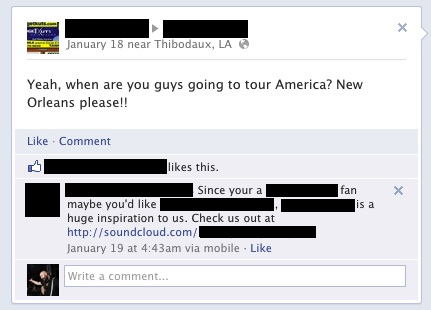
Don't be this guy, who incidentally posted this exact same comment on EVERY post on a certain other band's FB page.
Interact
This is pretty simple, and let’s face it, unless you’re as popular as Skinny Puppy (and if you’re reading this, you probably aren’t), you don’t really have an excuse for ignoring folks who want to rap with you. You don’t owe anyone a novel of a comment to their question about your lyrics or distortion chain, but a simple response, or even a just a like or a retweet can go a ways towards building up your relationship with your fans. It’s not just the person you’re responding to you’re creating a relationship with: if you’re gracious, clever and pleasant it’ll be anyone witnessing it. Oh yeah, and answer your e-mail. Speaking from experience that gets out of hand in a hurry if you don’t do it in a prompt fashion (if we currently owe you one we’re super, super sorry! Please don’t hate us!).
Use Proper ID3 Tags
You’d think this would be commonplace at this point, but it’s surprising how many MP3s, either sold or promotionally distributed, still don’t have correct ID3 tags. Not tagging your MP3s can result in any or all of the following: your album being played out of order on media players, your album being almost impossible to locate via some search functions on your listeners’ computers, your album being completely impossible to locate if it’s moved onto a portable MP3 player, DJs not being able to find your tracks quick enough while using USB enabled decks, listeners not being able to tell at a glance what’s playing if they have their library on shuffle, and driving people who are completely anal about their last.fm pages up the wall (okay, that last one’s not actually important). You wouldn’t put an LP with an incomplete track listing or a CD with improper song indexing on the market (well, maybe you would if you were Boyd Rice): don’t put out a digital release with crap ID3 tags.
Digital Is Not Optional
We understand that people have a range of opinions about digital media (yes, we know it’s inaccurate to exclude CDs from the digital media category, sue us), but we’re now fourteen years on since the emergence of Napster, and the first MP3 encoder is now nearly old enough to drink in Canada. People have always complained about the shrinking of LP art since the CD emerged, but choosing to cling to that as an excuse for not releasing CDs in the mid 90s and still complaining about a lack of sales would have been sheer madness. What does all this mean? You need to have at least one avenue for people to buy your regularly released albums digitally (unless you’re consciously courting obscurity and inaccessibility as part of your aesthetic as so many black metal and noise musicians do). The day your new album is released, the one which you’ve been talking up online to your fans, you need to give them at least one option, one link to buy the plain-jane, no-frills version of that record, whether it’s BandCamp, iTunes, your label’s store, or your own in-house shop. We realise that you might want to save bonus tracks, remixes and the like for special physical editions, vinyl or boxsets, and on that note…
Make Physical Media Special
The convenience and portability of digital media is a big part of what’s driven down sales of physical records, so give your fans an incentive to buy physical copies if you’re issuing them. Yes, give them a digital download with the sale of an LP, but also try to offer something about the LP or CD that’s unique to that medium: a gatefold sleeve, coloured vinyl, bonus tracks which can only be “decoded” from the liner notes (a trick used to great effect on Everything Goes Cold’s The Tyrant Sun), unique packaging. This can obviously get expensive (though perhaps not if you’re really laterally minded), but maybe you only cook up deluxe physical editions once in a blue moon, or in very limited numbers, further motivating the die-hard portion of your fanbase.
Offer Your Guests An Appetizer
Hopefully at some point before your hot new album’s release, and definitely after, fans and media should have access to at least one embeddable streaming track from your new release. You don’t need to make the whole album streamable and we’re emphatically not saying that you need to give away any free downloads, but there should be a small but fully realised piece of your work available as a preview for your listeners to get pumped about, and for press organs who are trying to give your release some shine (Hi!). If you’re already using BandCamp, congrats: this one’s probably already done. Obviously this can get tricky for long, single track pieces, so put your thinking caps on, dark ambient peeps.
You Can’t Buy Fans, Only “Likes”
Facebook ads have their place, and can be a useful tool for getting noticed. But it sets off alarms in potential fans when they see you have 20,000 followers and zero people posting on your page. “Likes” don’t mean doodly if you don’t have the music to back it up. In fact they’re hurting you, since they’ve removed your ability to gauge how many genuine fans you have versus people who randomly clicked on the “like” button when your name popped up in the sidebar. Organic growth of your audience comes from making good music and getting it out to people, and there aren’t any shortcuts to that. Save your cash, and put your time towards your art.
Be Visually Interesting
It’s a fact that long before we hear your band, you will have made some kind of visual impact on us. It goes like this: we see your name mentioned somewhere, we google you to find your web presence and then one of two things happens when we visit your site: a) We find a bunch of band pics of you with dread-falls and goggles, or zombie make-up or covered in fake blood or a flyer for your show with a naked girl writhing on a microchip in a gasmask and we immediately lose interest, or b) we see something cool and different and hopefully intriguing that suggests your music is also pretty cool, and we’re keener to hear what you do. Okay, so cool is pretty arbitrary as a goal, but think of it this way: if you could exchange your band photos or album art with another band who sounds similar to you without anyone noticing, you haven’t done a very good job of making yourself stand out. Yes, yes, it should be about the music first and foremost, but in this climate you can’t get away with doing the same shit as everyone else without it coming off as derivative. Speaking of which…
Some Fonts Need To Die
…It’s 2013. There are man-made vehicles exploring Mars. The sum total of human knowledge can be accessed anytime from a device not much larger than a business card. People are endeavoring to print functioning handguns. In short, it is the motherfucking future, and there is not one single, solitary valid reason for your record or website to use the Ogilvie or Abaddon fonts. None.
What online pitfalls to watch out for and tips do you have for bands? Leave ’em in the comments! And no, we weren’t talking about your project in this article, promise.

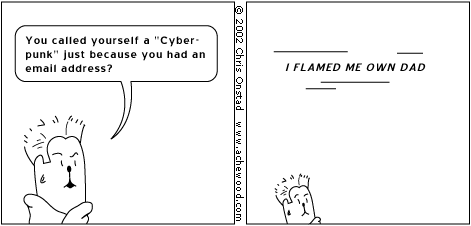


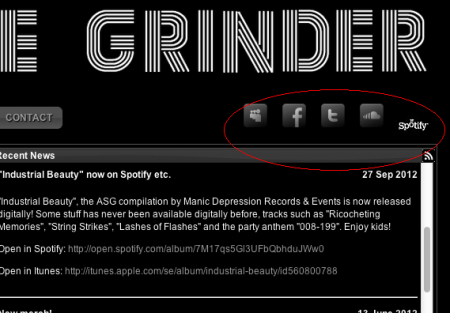
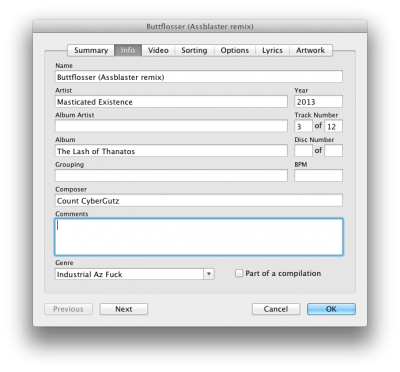

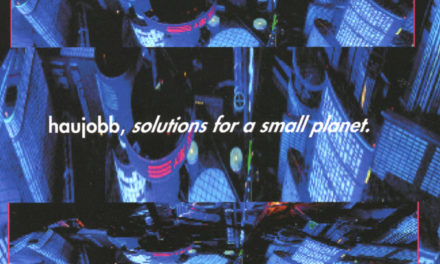
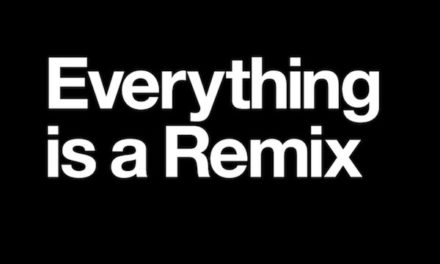

A very interesting article. If your reading this and you are a band, I will just add to the topic about postings rants. You need to be careful about what you like on social networks.
The trend is the more people you like the more they like you and so you increase your fan base.
Yesterday I unliked a band which I had followed for years based on their liking of a Facebook group.
On the surface of the group they liked it seemed politically confused and slightly naive, although on further reading the posts I read support for fascism/Nazi and that they were suggesting they were superior as they had money and should not look after those who do not. The group was a lot more serious and organised (Funded as well) than the about you section said.
I was so shocked of the idea that the band shared these views themselves that I unliked the band. After all their music is average and my life will not change without their presence.
I realise my own experience is quite specific but the point is the same, everything you do on a social media site is up for scrutiny and just liking pages to increase your fan base can have a knock on affect if you do not check the group/page before you like it. After all liking something is saying this is me, when perhaps it may not be if you read deeper.
1. Test your site to make sure your links work. This tool http://www.xml-sitemaps.com/ will let you know if you have any dead links. check periodically.
2. When an artists takes photos for you, creates your sleeve for your CD, promote them like Fractured have done. It says you respect others artists and mediums and creates another valid and interesting reason to get touch with fans.
3. Copy what Dead when I found her have done, post positive news from site like this and says thanks on Facebook. Remember just like the artists who have worked for your band they probably are not getting paid much if not at all. Neither are these guys, without them you will never be found.
If your in a band and want a website for free or guidance then post on here and i will give you a hand, my career is in in web testing and user interface design. I am more than happy to help and answer your questions from a design and techie point of iew
Editor/web master – How do you fancy a project where we look to show how to do this correctly for a new band or an existing one that wants help?